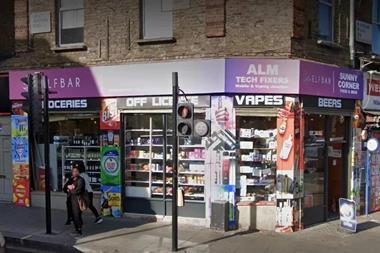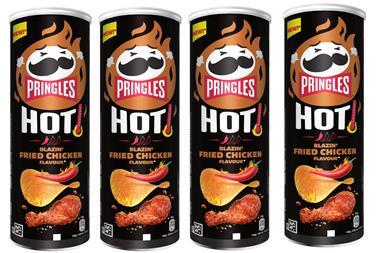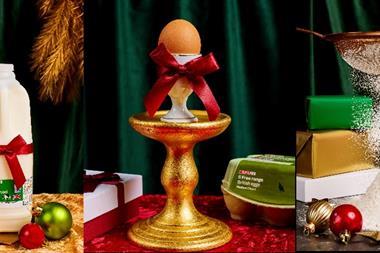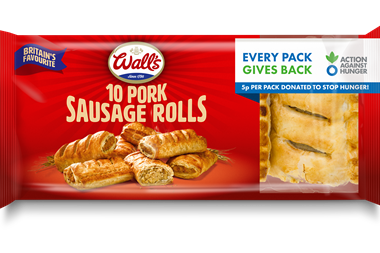The products stocked behind the till pose something of a dilemma. Moving high value ranges off the shop floor may reduce theft but could also reduce your impulse sales.
For instance, retailers have traditionally put large spirits behind the till because of their habit of walking off the shop floor shelves. However HIM's CTP 2008 survey of 30,000 convenience store shoppers found that 15% were buying cigarettes from behind the till but only 1% bought spirits.
Schemes such as the Take Home Blueprint 'Putting Leaders on Display' (PLOD) actively encourage retailers to bring spirits onto the shop floor through the use of security caps to reduce theft. Ross Shelley, scheme director, says putting spirits on the shop floor encourages retailers to buy larger sizes as there is a stigma attached to asking for large bottles.
Terry Fieldhouse installed PLOD security caps into his three Sheffield TC's Mini Mart stores and says that his Ecclesfield Store saw spirit sales boosted by 100%. He comments: "Now that my spirits are on self-select, customers can see the price differences for themselves. So, not only are they upgrading from half bottles to 70cl, they're also moving up from own brand to branded, when they see that the price difference can be as little as £1. The result is that sales of lines like Smirnoff have gone through the roof, yet surprisingly, my own brands are still selling well."
Another traditional behind the till resident, cigarettes, could be heading for a change. We are still waiting for the outcome of the Department of Health's consultation on tobacco control, but it remains a possibility that such products will 'go dark' within the next couple of years, potentially creating a space to be filled.
PLOD suggests putting smaller bottles of spirits behind the counter, so more space here may actually help retailers. Shelley says: "By siting the bigger bottles near the counter you can stock the small variants, which can suffer through lack of visibility, in their place."
Another option could be to extend the toiletries available behind the till, as Unilever's Partners for Growth initiative warns that this is a profitable area currently being missed by some convenience stores.
"Although every household in the UK buys into the health and beauty market, 18% of UK shoppers do not know that toiletries are sold in their local convenience store," explains Unilever's merchandising manager Nick Widdowson. "This category could prove to be very valuable to independent retailers, so it's important that shoppers can firstly see the category, and then identify the different areas within it."
Being small and of high value, batteries are a prime target for shoplifters but, as an impulse item, stocking them behind the counter could be detrimental to sales.
IRI/GKF figures for July 2008 show that the UK's battery market is currently worth £314m but that 70-75% of battery buyers do not plan to buy batteries when they enter a shop. The survey goes on to say that a quarter of all battery purchases are made on impulse, and 64% of those sales are prompted by in-store displays either on the main fixture or through promotions and incentives at till checkouts or secondary sites.
Boke Boddin, marketing manager at Energizer, says retailers are right to take security seriously, although it's still important that batteries are easily visible to shoppers so they can consider the type they need.
"Research shows that shoppers spend around one minute at the battery fixture - longer than other grocery categories. This indicates that they are not just buying batteries automatically and want to take time to consider their purchase," she says.
Panasonic offers similar advice. Marketing manager Tim Clark says: "Although retailers are often reluctant to bring high value items from behind the till area, there are a number of simple things they can do to maximise visibility and sales, without putting valuable stock at risk."
Clark explains that by ensuring displays are not cluttered or obscured by other products, and by using simple POS signage to flag up battery range availability, retailers have seen astonishing category sales increases of between 50% and 100%.
Local circumstances can lead to a diverse mix of products being kept behind the counter. West Midlands retailer Malcolm Crump says he has been suffering increased levels of shoplifting in his Spar shop in Crompton, leading to some interesting stocking decisions.
He comments: "Over the last two or three weeks it's been particularly bad; I don't think the current economic situation has a direct influence on theft but if people are short of cash they may be more likely to say yes to the bloke in the pub selling stolen products out of a bag."
He currently stocks spirits, batteries, toiletries, medicines and DVD discs behind the till but has recently gone one step further by moving his coffee jars off the shelves.
He says: "About 18 months ago we noticed coffee kept disappearing off the shelves. We were putting the stock out and the whole lot would go into someone's bag. We'd re-stock and the same thing would happen."
As a result, Malcolm decided to put a sign on the rack saying coffee is now available behind the counter.
Malcolm doesn't rule out a similar move for other high value products, but admits that the counter can be a barrier to sales. As he says, "People always like to handle products before they buy them." So the great dilemma remains.
For instance, retailers have traditionally put large spirits behind the till because of their habit of walking off the shop floor shelves. However HIM's CTP 2008 survey of 30,000 convenience store shoppers found that 15% were buying cigarettes from behind the till but only 1% bought spirits.
Schemes such as the Take Home Blueprint 'Putting Leaders on Display' (PLOD) actively encourage retailers to bring spirits onto the shop floor through the use of security caps to reduce theft. Ross Shelley, scheme director, says putting spirits on the shop floor encourages retailers to buy larger sizes as there is a stigma attached to asking for large bottles.
Terry Fieldhouse installed PLOD security caps into his three Sheffield TC's Mini Mart stores and says that his Ecclesfield Store saw spirit sales boosted by 100%. He comments: "Now that my spirits are on self-select, customers can see the price differences for themselves. So, not only are they upgrading from half bottles to 70cl, they're also moving up from own brand to branded, when they see that the price difference can be as little as £1. The result is that sales of lines like Smirnoff have gone through the roof, yet surprisingly, my own brands are still selling well."
Another traditional behind the till resident, cigarettes, could be heading for a change. We are still waiting for the outcome of the Department of Health's consultation on tobacco control, but it remains a possibility that such products will 'go dark' within the next couple of years, potentially creating a space to be filled.
PLOD suggests putting smaller bottles of spirits behind the counter, so more space here may actually help retailers. Shelley says: "By siting the bigger bottles near the counter you can stock the small variants, which can suffer through lack of visibility, in their place."
Another option could be to extend the toiletries available behind the till, as Unilever's Partners for Growth initiative warns that this is a profitable area currently being missed by some convenience stores.
"Although every household in the UK buys into the health and beauty market, 18% of UK shoppers do not know that toiletries are sold in their local convenience store," explains Unilever's merchandising manager Nick Widdowson. "This category could prove to be very valuable to independent retailers, so it's important that shoppers can firstly see the category, and then identify the different areas within it."
Being small and of high value, batteries are a prime target for shoplifters but, as an impulse item, stocking them behind the counter could be detrimental to sales.
IRI/GKF figures for July 2008 show that the UK's battery market is currently worth £314m but that 70-75% of battery buyers do not plan to buy batteries when they enter a shop. The survey goes on to say that a quarter of all battery purchases are made on impulse, and 64% of those sales are prompted by in-store displays either on the main fixture or through promotions and incentives at till checkouts or secondary sites.
Boke Boddin, marketing manager at Energizer, says retailers are right to take security seriously, although it's still important that batteries are easily visible to shoppers so they can consider the type they need.
"Research shows that shoppers spend around one minute at the battery fixture - longer than other grocery categories. This indicates that they are not just buying batteries automatically and want to take time to consider their purchase," she says.
Panasonic offers similar advice. Marketing manager Tim Clark says: "Although retailers are often reluctant to bring high value items from behind the till area, there are a number of simple things they can do to maximise visibility and sales, without putting valuable stock at risk."
Clark explains that by ensuring displays are not cluttered or obscured by other products, and by using simple POS signage to flag up battery range availability, retailers have seen astonishing category sales increases of between 50% and 100%.
Local circumstances can lead to a diverse mix of products being kept behind the counter. West Midlands retailer Malcolm Crump says he has been suffering increased levels of shoplifting in his Spar shop in Crompton, leading to some interesting stocking decisions.
He comments: "Over the last two or three weeks it's been particularly bad; I don't think the current economic situation has a direct influence on theft but if people are short of cash they may be more likely to say yes to the bloke in the pub selling stolen products out of a bag."
He currently stocks spirits, batteries, toiletries, medicines and DVD discs behind the till but has recently gone one step further by moving his coffee jars off the shelves.
He says: "About 18 months ago we noticed coffee kept disappearing off the shelves. We were putting the stock out and the whole lot would go into someone's bag. We'd re-stock and the same thing would happen."
As a result, Malcolm decided to put a sign on the rack saying coffee is now available behind the counter.
Malcolm doesn't rule out a similar move for other high value products, but admits that the counter can be a barrier to sales. As he says, "People always like to handle products before they buy them." So the great dilemma remains.



























No comments yet